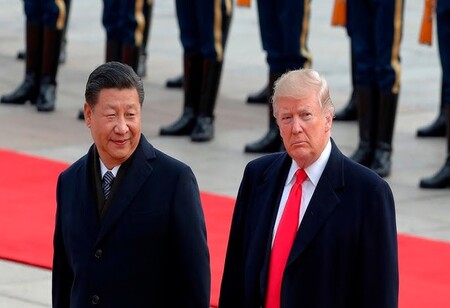
China Urges Trump to Lift Security Curbs


During his initial term, U.S. President Donald Trump altered Washington’s approach to China by adopting a confrontational stance, initiating a trade war, and overturning years of established policy.
During his second term, hardliners in Washington regarding China worry that Trump is becoming lenient.
While Trump negotiates a trade agreement with the U.S.'s primary economic and strategic competitor, supporters of a more rigorous China stance worry they're being marginalized within the administration as the tech sector's power increases — coinciding with the president's desire for what he refers to as "a big deal."
That worry has intensified as Trump anticipates an upcoming meeting with Chinese leader Xi Jinping. In the leadup, China has put forth a variety of requests that could disrupt decades of U.S. policy, such as relaxing restrictions on investment in return for increased inflows and diminishing U.S. backing for Taiwan.
Also Read: How Reif Othman Makes Dining an Art
Amplifying their anxieties, Trump has demonstrated his readiness to dismiss the hawks' worries, including by negotiating a deal to safeguard the video-sharing platform TikTok and proposing to allow Nvidia to supply certain AI chips to China.
He has removed numerous advisers from the National Security Council who supported a firmer stance on China and reduced the council's influence to such an extent that security and technology specialists are concerned that there is no one remaining to challenge those favoring closer business relations with Beijing.
Also Read: Why Apple is in an Unstable Position in China
"Beijing is currently in an advantageous position,” stated Matt Pottinger, who oversaw the NSC's efforts on China as deputy national security adviser during Trump's initial term. "The White House appears oblivious to the fact that its TikTok stance and its relaxed chip export restrictions are significant, one-sided concessions to the Chinese Communist Party."
In certain respects, Trump's position shouldn't be unexpected considering his stated eagerness to negotiate with global figures typically rejected, such as Russia's Vladimir Putin and North Korea's Kim Jong Un.
However, the risks are significantly greater with China due to the deep interconnections between the U.S. and Chinese economies, along with China’s capacity to compete with the U.S. in artificial intelligence, semiconductors, and cybersecurity.
Also Read: 5 Interesting APAC CTO Appointments in August 2025
Trump has cited national security to implement tariffs on various imports, such as aluminum, steel, and kitchen cabinets. However, throughout his initial term, he was known for dismissing attempts to hinder sales to China and criticized his staff for what he termed the "phony concept of national security.”

